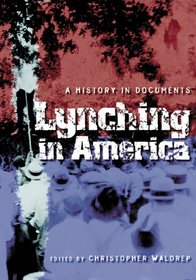Search -
Lynching in America: A History in Documents
Lynching in America A History in Documents
Author:
"Christopher Waldrep's volume should quickly become one of a handful of standard reference works on the subject of lynching. His knowledge of the literature on lynching is masterful and far ranging. Lynching in America is an important book." — ?Thomas H. Appleton, Jr., Eastern Kentucky University?An exemplar documentary history....While ly... more »
Author:
"Christopher Waldrep's volume should quickly become one of a handful of standard reference works on the subject of lynching. His knowledge of the literature on lynching is masterful and far ranging. Lynching in America is an important book." — ?Thomas H. Appleton, Jr., Eastern Kentucky University?An exemplar documentary history....While ly... more »
ISBN-13: 9780814793992
ISBN-10: 0814793991
Publication Date: 1/1/2006
Pages: 303
Rating: ?
ISBN-10: 0814793991
Publication Date: 1/1/2006
Pages: 303
Rating: ?
0 stars, based on 0 rating
Publisher: NYU Press
Book Type: Paperback
Other Versions: Hardcover
Members Wishing: 2
Reviews: Amazon | Write a Review
Book Type: Paperback
Other Versions: Hardcover
Members Wishing: 2
Reviews: Amazon | Write a Review
Genres:
- History >> Americas >> United States >> General
- History >> Historical Study & Educational Resources >> Social History
- Politics & Social Sciences >> Crime & Criminals >> Criminology
- Nonfiction >> Social Sciences >> Violence in Society
- Biographies & Memoirs >> True Crime >> Murder & Mayhem
- Biographies & Memoirs >> True Crime >> True Crime




